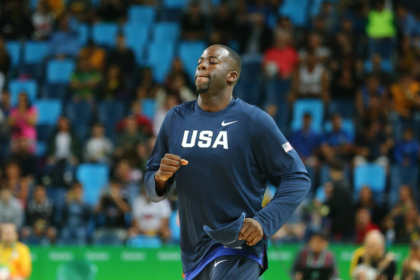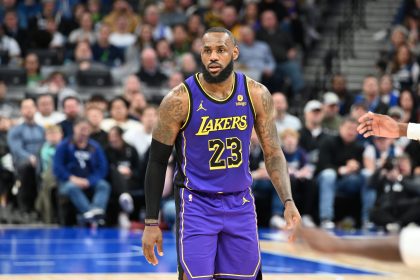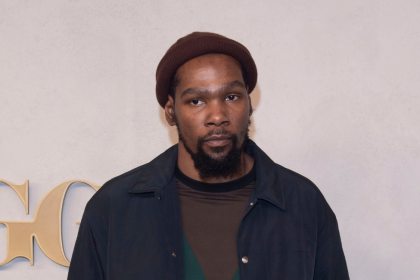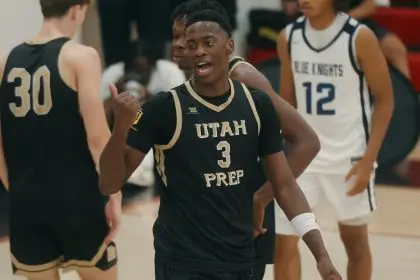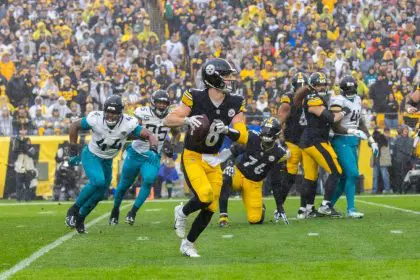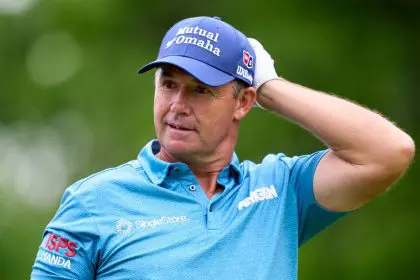[jwplatform AbeCMmLf]
“I’m trying to lead a productive life. I always check my actions when I walk out the door — this is why I’m gonna do this. After being so selfish for my entire life — because everything’s been given to me so easy — to become selfless is a hard thing. It’s a humbling thing, a humbling experience,” says Anderson.
The film’s arc begins with video of Anderson watching the basketball court from the sidelines when he was at Georgia Tech, one of the many basketball stops during a playing career that was hyped from the moment Anderson stepped onto the hardscrabble concrete courts of the gritty LeFrak City housing development in Corona, Queens. That scene soon morphs into the modern day, where Anderson is taking a dip in the pool of a Florida housing complex, and a passerby asks him if he’s somebody famous.
“Used to be,” Anderson says in the film.
The point guard who once starred for the late Molloy coaching legend Jack Curran, admits in the film that he endured a chaotic home life with his single mother, who he says abused alcohol and drugs. Anderson also peels back the layers of when he was sexually molested by a Queens neighbor during his childhood. He says that the mistakes and missteps in his life — including his own continuing battles with alcohol — are due in large part to the hell he survived during childhood.
“When you’re abused — verbally, physically — you don’t know love. My third wife [Natasha], she said, ‘I love you at your worst.’ The film, it’s painful but it’s true. It’s honest,” says Anderson. “If I talk about it, it can help somebody. I can be a voice because of my platform — ‘Hey, I’m human.’ In most cases, kids don’t have anything to look toward — it’s just real dark. They commit suicide, go to drugs — heavily. I did alcohol a lot. I caught myself. I said, ‘I’ve got to get out of that life.’ ”
Anderson’s otherworldly talents at Molloy and at Georgia Tech — where he played for Bobby Cremins – are well chronicled in Mr. Chibbs (the film’s title comes from Anderson’s nickname that his mother gave him at birth), and he says that those years still represent his halcyon days.
“Pure happiness and joy, playing high school ball at Molloy for four years and two years in Atlanta [at Georgia Tech]. Getting coverage, the way y’all covered me in New York, I was on top of the world,” says Anderson. “I got everything early. I got a lot of praise. I became a household name in New York at an early age because of the media.”
But Anderson says that like a lot of athletes who come from difficult backgrounds and broken families, when he was suddenly immersed in wealth and fame, it was a crushing burden to live with day after day.
“I was acting out because of the things I’ve been through in my life. Some days it was complete hell,” says Anderson. “I was a good actor, walk out the door, put the mask on. S— ain’t perfect. I might have my bills paid, nice car, nice home. S— is still crazy. That’s how I lived — forever. It holds weight. Every day you’re waking up like, ‘If they only knew. If people only knew.’ When you let material things control you, you got problems.”
While Anderson’s NBA career was more than respectable, it never quite lived up to the success and accolades he racked up in high school or when he was at Georgia Tech, where he helped the Yellow Jackets to the Final Four in 1990 along with teammates Dennis Scott and Brian Oliver — the trio nicknamed “Lethal Weapon 3.” Georgia Tech lost to eventual champion UNLV in the Final Four that year.
Anderson, who lives in south Florida now, visits with Cremins, Scott and Oliver in the film, and returns to his old Queens neighborhood and high school. He reconnects with his children scattered around the country. He stops by to see former agent David Falk, the same super agent who represented Michael Jordan and Patrick Ewing. Anderson even travels to Arizona State University in the film and meets with his old college hardcourt nemesis, Bobby Hurley, the Jersey City, New Jersey, product and former Duke star who is currently the head coach of the Sun Devils men’s basketball team. There, Anderson gives a motivational speech to Hurley’s players.
Whether another coaching opportunity presents itself to Anderson in the future remains to be seen, but he is the first to point the blame at himself for making mistakes that could cloud his future goals and aspirations. His focus now is on his children — who he says range in age from 15 to 26 — and his wife, but Anderson still hopes a second chance will arrive.
“It’ll come along one day. I’m young. I’m going down the right path. I gotta just keep the faith and keep doing the right thing. Life lessons,” says Anderson. “I don’t run away from my mishaps. That’s why the documentary is so real. If you want to judge me on the DUI, keep me from helping you, your program, your kids, so be it. That’s the wrong thing to do. I was honest and open. We’re in that type of world right now, where honesty is the best policy. This is just a story, where I’m at, where I’m going. There’s more to my legacy, more work that I need to do on myself to progress.”
Photo credit: Raymond Hagans/Steed Media Service













